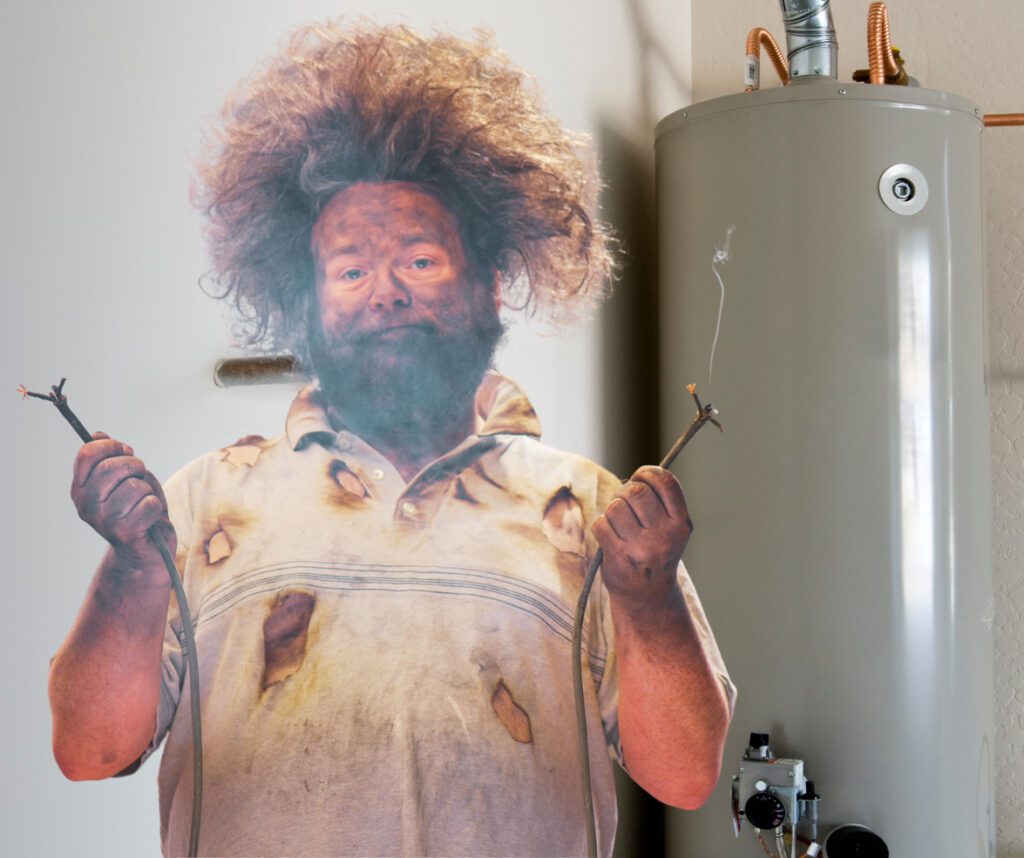Hot water heaters are indispensable to our modern homes. Because these parts of our homes deal with pressure and heat, they are equipped with numerous safety features like flow sensors and temperature gauges to avoid turning any malfunctions into problems.
However – despite being infrequent – tank water heater malfunctions and long-term wear and buildup can have catastrophic consequences: while flooding and damage to your house can occur, there is also the chance of explosion. With a large blast of superheated water carrying metal pieces of a tank, the results are destructive and can be deadly. Systems that are well-past their replacement date or those that haven’t been properly maintained are at higher risk of failure: with the eventual degradation of parts, regular maintenance and replacement of your water heating system is part and parcel to minimizing any danger.
But don’t fret – your water heater will give you signs that something is malfunctioning in regard to heat, pressure, or otherwise. Having an understanding of what these signs are will allow you to notice them early on and call a specialist, minimizing any risk that a damaged water heater might pose.
A. How does a water heater explode?
The main factors that would cause a water heater to explode have to do with temperature and pressure. Malfunctions in the system that would cause an excess of either of those factors is the most common reason a tank could burst.
Subject to heat, molecules vibrate faster and expand. If heated too much in the water heater, the thermal expansion of the water could increase the pressure inside the tank and cause the integrity of the tank or its valves to be compromised.
Incorrect temperature settings
If your tank’s temperature settings are not calibrated or your temperature gauge is malfunctioning, the heating element inside the water heater may be operating at too high of a temperature. If it stays like this for too long, the superheated and expanded water (and vapor) in the tank will put undue stress on the unit and its components, resulting in valves failing and the structure cracking.
Sediment buildup
- One of the key reasons why regular descaling and maintenance is important: a buildup of sediments from your hard water can contribute to a tank explosion. Among other chemicals, the main ones present in your hot water are calcium and magnesium – deposits of these chemicals will bind to the metal of your water heater and home’s plumbing, affecting the quality of your water and the integrity of your piping.
- In a hot water heater, deposits from the hard water can form at the base of the tank and solidify, creating lime scale (calcium carbonate). Lime scale is partly insulative and if too much is present in the tank, it can serve to elevate the temperature of the tank and keep it at a heat that poses pressure buildup risks.
Malfunctioning components
- Over time, the constant exposure to hard water causes the internals of a hot water heater to degrade: parts oxidize, valves wear down from heat, lime scale impedes flow rate and sensors, among more. Part of the reason water heaters are given finite lifespans is to account for the general, eventual degradation of the entire unit. Repairs and regular maintenance are important to extending the lifespan of your water heating system but if you let it go too far past its replacement date, you can risk the failure of the unit.
- When metal components oxidize, they can become blocked or leaky, impeding the flow rate and pressure regulating functions of your water heater. Worn-down or melted valves might struggle to fully open or close when pressure builds up, pressure gauges might be damaged, temperature sensors might malfunction and increase the heat of the elements when it’s not needed, gas valves might leak – igniting at high heat, and more. Keeping an eye on the signs that your water heater is malfunctioning is an important part of mitigating risk and catching problems ahead of time.
Improper installation
- When your water heater is installed, it is critical for an experienced technician to handle the job. Water heaters are simple in theory but there are a few critical characteristics to the way they operate that makes the benefits of hiring a pro far outweigh the cons. If your venting system or fuel lines were improperly attached, if valves were installed or tested incorrectly, if the temperature was not set to the unique plumbing of your home, pressure and temperature buildups are possibilities. Furthermore, improper installation of venting systems with gas units can increase the risk for unsafe carbon monoxide levels.
- Hiring a reputable, certified, and trusted water heater installation service is the best way to nip any risks in the bud. They’ll be able to guide you through anything you might need to know as an owner of the unit after it’s installed, telling you what to look out for and when to call them again. Don’t forget, at Pink Plumbing we omit call-in fees for our customers who installed and service their water heaters with us.
B. Signs your water heater could explode
Your water heater will give off a few signs if there are any temperature or pressure risks building in the unit. Let’s take a look at a few. If you suspect your hot water could explode, call us to discuss replacing your hot water heater.
Leaking
- Leaking is always a good reason to call a water heater technician. If it’s happening because of a loose part, oftentimes all that is required is a water shutoff and the tightening of the connection. In other cases, it can indicate a more serious problem. In order to avoid damage to your home and the chance of explosion, address leaking right away.
- If your temperature and pressure valve (otherwise known as a T&P valve or TPR valve) is degraded or malfunctioning, it will leak water. This means the pressure in the tank is so great it is inhibiting the valve from releasing excess pressure as it is supposed to, and water begins to push its way through. Sediment build-up is usually a culprit. Defects and malfunctions with this valve are the leading cause of water heater explosions.
TPR valve never closes
The temperature and pressure valve will open when it detects that there is too much pressure in the tank, caused by the excess expansion of the water. In some units, the TPR valve is also in charge of letting cool water into the tank when the temperature exceeds a preset point, lowering the pressure inside the tank. Once that pressure is released, the TPR valve closes. If you notice that your TPR valve is always open, it is likely that it is malfunctioning or that the temperature and pressure of your water tank are at constant, unsafe levels.
Smell
With risks related to gas fuel, weird smells around your home and near your water heater are important to address. If a gas leak is damaged or a connection from the fuel main to your tank is faulty, you might notice a sulfur/rotten egg smell from excess gas. This can be very dangerous if it is lit by the heating element and pilot light in the unit, risking explosions and fires.
Noises
- Noises like knocking sounds and popping from the inside of your water heater are very important to notice and deal with. Without regular descaling, large build-ups of calcium carbonate will form at the bottom of the tank between the heater and the water, effectively insulating the heat exchanger. The water will thus not be heated as efficiently and the temperature gauge in the tank will alert the heat exchanger to increase in power.
- Knocking noises come from large chunks of sediments moving around the tank, a clear indicator that your unit needs to be descaled. Popping noises are the ones you really want to look out for: this indicates that water trapped between the lime scale build up and the overactive heater is being superheated, boiling and escaping the sediment layer from the sides. Not addressing a sediment build-up will cause other valves in your unit to become blocked and malfunction, increasing the risk of serious failure.
Water quality
Changes in your home’s hot water quality can serve to indicate malfunctions in your water heating unit. Cloudy water can indicate lime scale build ups and brown water points to tank oxidation. As we’ve seen, too much build up or oxidation can compromise the integrity of the unit and lead to explosions. Brown water is always a reason to call a specialist.



